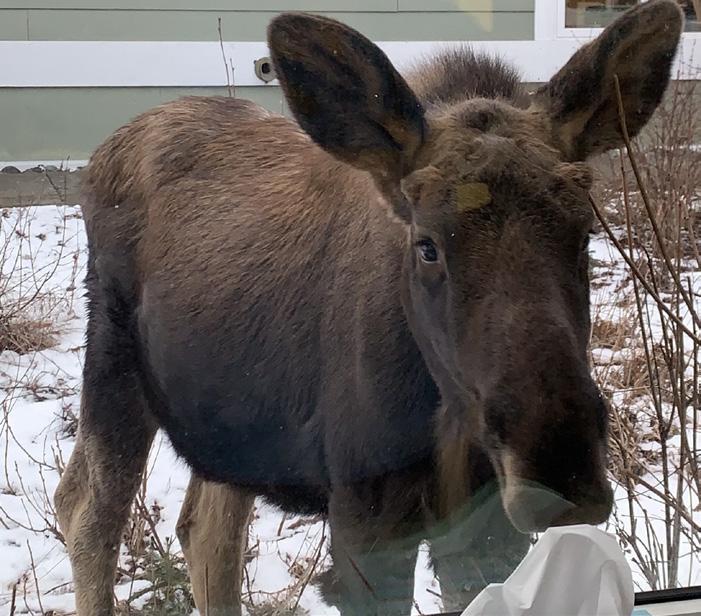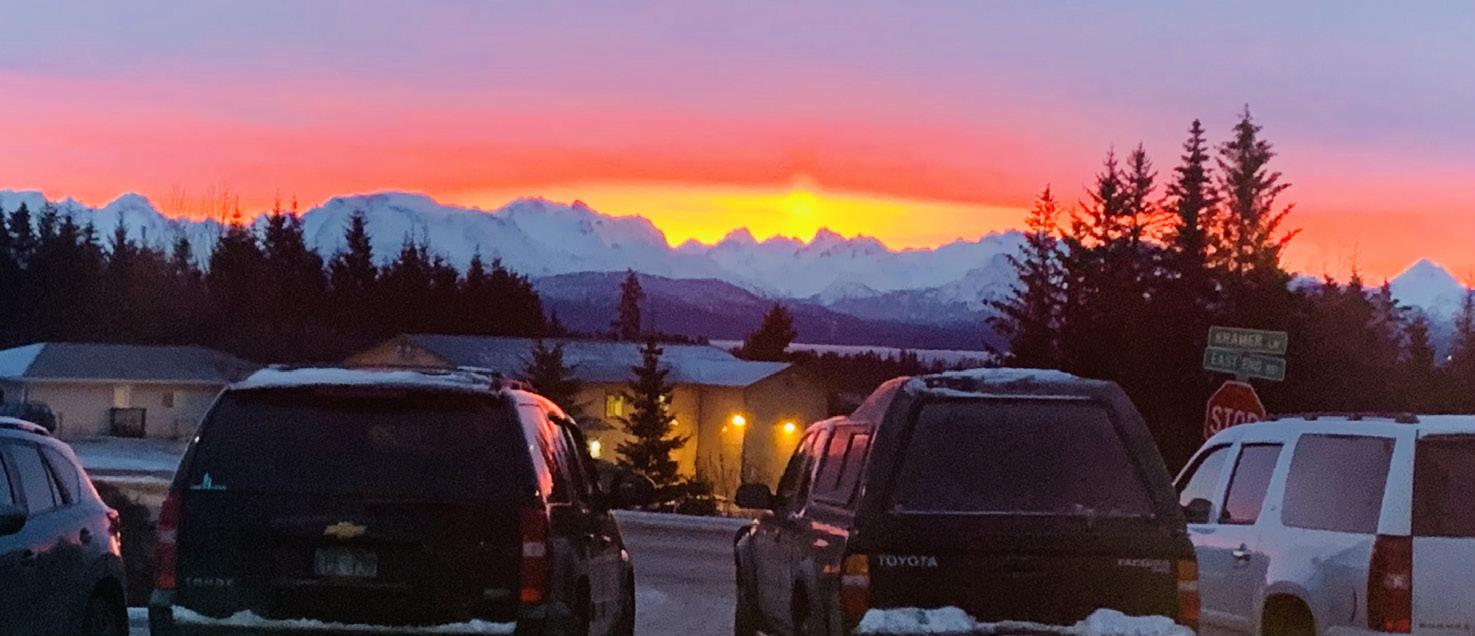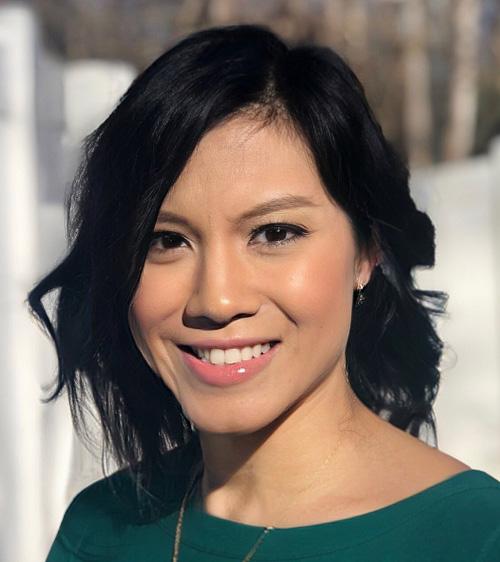
6 minute read
Leadership Through Courage
Delivering the Vaccine to the Last Frontier
Julie Drude, FNP Class 136, CNEP Class 81, DNP Class 26, doesn’t “do boats. I don’t like them. I hate boats.” Even though she was born and raised in Hollywood, Florida, and resides in Chattahoochee, Florida, she said “my extent of the beach and the waves is laying on the beach and sunbathing. I don’t do boats.”
Advertisement
Why, then, was she pictured in front of a boat in Alaska as part of a widely circulated news story in January? The answer as to why she’s in Alaska is that Drude is a travel nurse, currently working as a locum tenens in Homer, Alaska. The answer to why there’s a boat in the picture is because Drude, fellow FNU graduate Kourtney Holder, DNP, Companion, DNP 2, and two other medical personnel were delivering the COVID-19 vaccines to Seldovia, a small town located on Alaska’s Kachemak Bay, about 25 miles from Homer. There are no roads to Seldovia -- the only ways to get there are across the bay via bush plane or, unfortunately for Drude, by boat. Drude began working as a travel nurse in 2012, with her first assignment being the rural town of Bethel, Alaska. She worked there again in 2015 and 2017, and in Valdez, Alaska in the summer of 2020. This is her first trip to Homer, however, with her assignment scheduled from December through March. So, despite her familiarity with rural Alaska, she was not prepared for her assignment on her fourth day in Homer. “It was my fourth day here and they were like, ‘Oh, by the way, you’re going to Seldovia today to vaccinate’,” she said. “That’s where the picture came from. That was the first day that we got the Pfizer vaccine. Now, this Florida girl who doesn’t do much flying or boating has to get on a boat or a bush plane every Monday and Tuesday and fly over to the village of Seldovia.” That day, like many in Alaska, the weather was too rough for the bush planes to make the trip over the bay. The only way was by boat. Make no mistake, this is no pleasure cruise across a tranquil bay. It’s a rough trip. “Because it was the Pfizer vaccine and there is that window that you have to use the vaccine, we had to take a boat,” Drude said. “It was my first boat ride in Alaska. We braved six-foot waves and rough water and delivered COVID vaccines. I had total faith in the captain of the boat, but it was like nothing I had ever experienced in my life. It was even rougher on the way back.” As scary and unpleasant as the trip was, Drude said it was well worth it.
“It was such an amazing moment to be one of the first people here in this community to deliver some vaccines
On December 17, 2020, this group braved rough waters to deliver the COVID-19 vaccine to the remote village of Seldovia, Alaska. Pictured (L-R): Candice Kreger, RN, FNU graduate Kourtney Holder, FNP, captain Curtis Jackson, and FNU graduate Julie Drude, FNP. (Photo by Janel Harris courtesy of Mako’s Water Taxi)

to Alaskans,” she said. “Mondays and Tuesdays are a little stressful waiting to know how we are going to get across the bay. But it’s been great. There are a lot of Alaska natives here and it’s rural, so it’s a great community to serve.” The site in Homer is a Federally Qualified Health Center (FQHC). In addition to Seldovia, and the main clinic in Homer, there is another satellite clinic in Anchor Point, about 20 miles from Homer. The clinic has been providing vaccines at the Homer and Seldovia sites, with the first round going to first responders and Alaska natives over the age of 65. “The majority of people are very eager to get the vaccine,” Drude said. “I think they see this as a ray of hope because, in places like Alaska, being outdoors and being with family and people, that’s such a huge part of life here. So many of these folks have been in isolation since March and April. Alaska was one of the very last states to be affected, but when the winter months came, COVID started hitting harder here.”
Drude was hit hard by COVID herself. From 2017 to 2020, she worked full time in school-based health in Florida. But when the pandemic began, found working from home to be an unproductive and poor use of her time. “I saw an ad for staffing in New York for the COVID crisis in April,” she said. “I did a three-week assignment in New York for COVID.”
By the end of her time in New York, she was experiencing shortness of breath. Thinking it was probably anxiety or the result of wearing an N95 mask for 12hour shifts almost 21 days straight, she nonetheless wore a double-mask on the flight home. “I went to the ER and my COVID test was negative but I had pneumonia with ground-glass opacities, which is a common finding in COVID pneumonia,” she said. “Over the course of three weeks, I had very random symptoms. Fever, body aches, chills with no fever, body aches with no fever, very odd muscle cramps from my hips all the way to my toes, shortness of breath continued, severe dizziness, headaches. It took me about three weeks to almost fully recover. I am 9 months out and I still suffer from tachycardia, dizzy spells, and brain fog. My case was not as severe as most. I was not hospitalized. I never even got a positive COVID test, but I did have antibodies six weeks after I was ill. Both my pulmonologist and my cardiologist said it was highly likely that it was COVID. I still have what they are calling long-haul symptoms.” Along those lines, Drude said she intends to be a travel nurse for the long haul. “My goal is to continue doing locum tenens as a nurse practitioner,” she said. Drude and her husband John have five children, ages 21, 19, 17, 8, and 6. “I like the idea of working in a big clump, then having some time off and being home with them. The beauty is most jobs I take, my husband and two younger children can travel with me.”
Despite treacherous boat rides, COVID, and the other hazards of being a travel nurse, Drude is drawn to the opportunity to provide care in areas where little is available.
“Even though I have a little anxiety about lots of things, I have found that this trip has gotten me way out of my comfort zone,” Drude said. “These residents have to depend on a boat or a plane to get out if they are sick or injured. It’s just nice to be part of something where I can be over there twice a week to provide the care that they need without them having to spend the extra money to go to Homer to get care.” Fellow FNU graduate Kourtney Holder accompanies Drude on many of these trips. Holder was contacted for this story, but unavailable for an interview. “I enjoyed my time at FNU and appreciate the great education I received there,” Holder said via text.
Drude echoed that comment, crediting FNU for readying her for the risks and rigors of travel nursing. “I felt very well prepared as a Frontier graduate to do any job,” Drude said. “I love the emphasis on rural health and getting outside of your comfort zone and going where no one has gone before to serve. Frontier ingrains that in you. Get out in the world and serve.”
Even if you have to do it by boat.

These photos that were taken by Julie Drude show the beauty of Alaska and the joy of being visited in the office by a curious moose.










